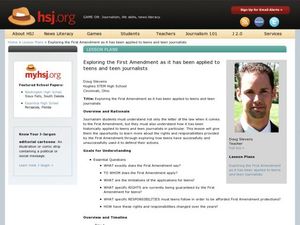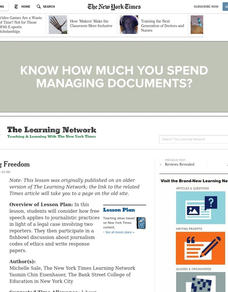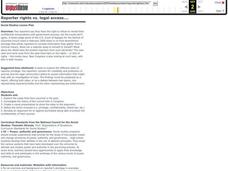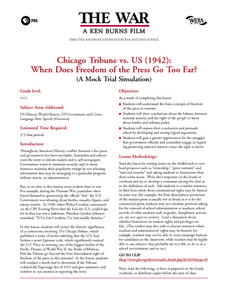Facing History and Ourselves
The Importance of a Free Press
"Congress shall make no law . . . abridging the freedom of speech, or of the press;. . ." Why is this guarantee of free speech and a free press the First Amendment to the US Constitution? Why are these rights so essential to a democracy?...
Curated OER
Exploring the First Amendment as it has been applied to Teen Journalists
Students explore the First Amendment as it has been applied to teens and teen journalists. In this First Amendment lesson, students memorize the First Amendment, complete online research of the topic, and quiz. Students read about...
Reporters Without Borders
2017 World Press Freedom Index
Freedom of the press was seen as a right so important that the Founding Fathers listed it as part of the first amendment to the United States Constitution. Americans pride themselves on this freedom, but just how free are American...
Curated OER
Citizen Journalism
Students examine the role of citizen journalism, freedom of the press, and the First Amendment. They analyze the results of an Internet survey, discuss the ethics of downloading copyrighted material on the Internet, and write a news story.
Newseum
You Can’t Say That: Right to Know vs. Security Risk
Print or block? That is the question young journalists debate as part of their study of the freedom of the press. Half the class represents the journalists' legal team, and the other half represents the government's legal team. Teams...
Benjamin Franklin Tercentenary
Franklin’s Fair Hand American Journalism
Scholars know him for his role in the American Revolution, but Ben Franklin was also a journalist and printer. Learners investigate his standards for what was fit to print using primary sources—including writings where Franklin explains...
Teaching Tolerance
Journalism for Justice
Roll the presses! Or at least have your class members participate in the time-honored tradition of the student press by creating their own newspapers or journalist pieces on a social problem. After conducting research and collaborating...
American Bar Association
News Literacy Model Curriculum in Social Studies
Scholars investigate news literacy in the twenty-first century. They use technology, legal decisions, writings, and digital privacy to analyze the topic. Using what they learned, a group assignment looks into both the challenges and...
Facing History and Ourselves
Free Press Makes Democracy Work
A unit study of the importance of a free press in a democracy begins with class members listening to a podcast featuring two journalists, one from a United States public radio station and one from Capetown, South Africa. The lesson,...
Newseum
'The Press and the Civil Rights Movement' Video Lesson
Scholars watch a video featuring journalists who covered the civil rights movement, then respond to questions on a viewing guide. The video features interviews with participants and original news footage from the 1950s and 1960s. In...
Newseum
From the Front Page to the History Books
Young journalists compare news coverage of four major events with how the same events are covered in historical accounts. The ensuing discussion asks class members to compare and contrast the role of a reporter and the role of a historian.
Newseum
Is This Story Share-Worthy?
Young journalists use a "Is This Story Share-Worthy?" flowchart graphic to decide whether a story is worth sharing online. Instructors provide groups with fake news, poor quality stories, opinion pieces, biased news, and high-quality...
Newseum
Free Press Challenges Through History: Analyzing Historical Sources
The debate over the integrity of stories in media is not new. Young journalists analyze historical sources that reveal freedom of the press controversies and draw parallels to challenges freedom of the press faces today.
Curated OER
Press-ing Freedom
Students consider how free speech applies to journalistic practices in light of a legal case involving two reporters. They participate in a fishbowl discussion about journalism codes of ethics and write response papers.
Curated OER
Leaders in Journalism
Students examine the changing leadership roles and qualities of writers, journalists and editors in public life. They view short video clips by prominent journalists and read about various journalists in history.
Curated OER
Students Press Law and Ethics
Students research the rights and the responsibilities of journalists in dealing with First Amendment issues. In this First Amendment lesson plan, students research the Alien and Sedition Acts and study the five elements of libel....
Curated OER
Reporter rights vs. legal access...
Students write an article to inform readers about confidentiality with reporters, attempting to find local lawyers and journalists to explain the issues as they relate to them. Students research past cases and the status of the current...
Curated OER
History Review: Colonial America
Explore key moments in American history with the click of a mouse! Learners read 50 questions from different eras in early America, and watch the rest of the presentation to find more questions to answer.
Curated OER
Reporter Rights vs. Legal Access...
High schoolers explore cases that have occurred in the past in which reporters refuse to reveal their confidential conversations with government sources and investigate the status of the current bills in Congress. Students use this...
Curated OER
Chicago Tribune vs. US (1942): When Does Freedom of the Press Go Too Far?
Young scholars define freedom of the press in peace and war time. As a class, they identify the need for the public to be informed, but discuss where the line should be drawn to protect national security. They develop their arguments...
Curated OER
Cartoons in the Classroom: Drawn to Freedom
In this current events worksheet, learners analyze political cartoons that feature the free exchange of ideas and government criticism. Students then respond to 2 short answer questions.






















